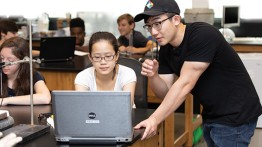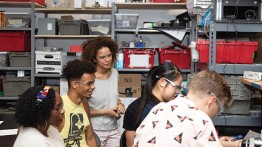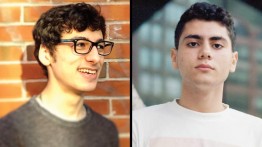Engineers in Education
POSTED ON: April 16, 2021
“To me education is not just about the delivery of content per se but I think it has to be about community and fostering an environment in which everybody is contributing.”
Teacher Michael Kumaresan made that remark when reflecting on one of the many difficulties of online education, but much the same could be said about teaching in general. While many Cooper alumni go on to work for companies like Google, BASF, and NASA, some like Kumaresan, who graduated in 2010 with a degree in electrical engineering, pursue careers in teaching after years of working as engineers.
Now Dr. Elizabeth Waters, associate director of STEM Outreach at Cooper, would like to encourage engineering students to consider teaching and mentoring earlier on. Waters recently launched STEM Teaching Fellowships, an internship program designed to nurture Cooper students’ commitment to education, mentoring, and service in their life’s work and engineering career. The 2021 STEM Fellows, Matthew Grattan and Mahmoud Khair-Eldin, worked previously as Summer STEM teaching assistants, an experience that ignited their desire to further pursue engineering education. “We're looking for students who are interested in teaching a Summer STEM class and then we’re really building on their interest in teaching to provide them with some other training, including communication training,” Waters says.
The goal is to equip fellows with what she calls “a tool kit” for teaching before the Summer STEM program gets underway again in June with the hope of adding a kinesthetic experience to the cerebral one. The toolkit includes practical training in the development of learning goals, curricula, activities, and class culture, along with resources and ongoing coaching throughout the Summer STEM program. “We want them to feel really successful and excited about teaching.”
Waters runs three programs that offer courses taught by Cooper undergraduates for middle and high school students interested in science and math: STEM Saturdays, Summer STEM, and STEM Days. As part of her efforts to highlight careers in education for her student teachers, Waters located Cooper engineering graduates who now teach or work in public education—Michael Kumaresan EE’10, Joanna Cruz EE’12, John Davis EE’98, Mike LaRosa ChE’99, and Donna Peruzzi EE’02—to interview them about the trajectory of their careers. She discovered that, at base, they were all drawn to the great changes they could make in their students’ intellectual lives.
The key to effective teaching, says Joanna Cruz, a public high school teacher at City Polytechnic High School of Engineering, Architecture, and Technology, is putting students’ experience and learning styles at the center of your lessons. “I've been focusing on how we can really make our curriculum relevant and decolonized.” She reflects on courses she took at Cooper with Professor Toby Cumberbatch, who taught electrical engineering until his retirement in 2018. His classes gave students the space to do their own research and make their work relevant to their interests. That combination of freedom and rigor, she found, kept students passionate about their work, and it’s a balance she tries to strike in her own classroom. “Toby never gave us any answers. We had to figure out and prove to him why we had to do this and why it made the most sense. And we got shot down so many times. And if anything, that drove us to continue to find answers.”
Kumaresan, who also recalls some professors employing the Socratic method in mathematics classes, characterizes his alma mater as rigorous but “humble” because of the accessibility of his professors and the support he received from older students who tutored first-years. That “near-peer” mentoring has long been part of the school’s undergraduate experience.
All of the alumni educators Waters interviewed feel that their engineering training has been particularly helpful in the classroom: first, the rigor of academics at Cooper prepared them not only for teaching the content of STEM classes, but for the long hours of planning endemic to the profession. They report that their tech skills and, more importantly, their problem-solving mindset gives them a great advantage as teachers. Mike LaRosa taught high school in New York City early in his career and now works as a consultant for non-profits launching health and education initiatives. The greatest challenge and pleasure of his work comes from the endless variety of obstacles that must be met to reach each organization’s goals. “In a nutshell, I help folks draw and elicit senses of clarity and calm from uncertainty and ambiguity. And you can draw a very clear through-line from what I do now to my experience at Cooper.”
Donna Peruzzi came to teaching right out of college by becoming a New York City Teaching Fellow—a competitive training program for public school teachers—and has remained in the profession for almost 20 years, now teaching middle school science. She feels her role ultimately is to encourage students “to be scientifically literate citizens and to make sense of what they're hearing about on the news and what they're experiencing themselves with their family, whether it's health care or climate change or the pandemic.” She seeks to provide her students with exposure to careers in STEM fields, especially those who have no family members in science or engineering.
All of the planning and area expertise won’t amount to much, though, without communication skills. “A lot of the engineers that come out of Cooper definitely are going to know how to solve the differential equation and get the computer program working,” says Waters, “but communicating that information is an essential part and becoming even more of an essential part of any job.”
John Davis concurs. He frequently finds that his high school students may get to know a subject remarkably well but forget to tailor their remarks to a general audience. He recalled taking classes at Cooper that hit on the need for good communication skills at the beginning of his undergraduate career and at the end. “If I were suddenly dean of engineering [at The Cooper Union], I think the biggest thing I would add is more stress on communication during the middle period [of an undergraduate education] as well.” Davis, like his fellow alumni, is passionate about opening STEM fields to women and people of color and believes teaching is the best way to substantially improve diversity. Communication is key to meeting that goal. As Peruzzi put it, “It’s both those concrete skills, but also helping them see that they don't need to be experts in order to make change and to have agency and start figuring out their pathways.”
STEM Teaching Fellowships are funded by the Cross Ridge Foundation with support from Joseph Dobronyi, a trustee of the Cooper Union and descendant of Peter Cooper.
STEM Saturdays is made possible thanks to the Alfred P. Sloan Foundation with additional support from the John Ben Snow Memorial Trust. The Summer STEM program is generously supported by the Henry Sterne Trust.







